This week has been a ride.
I almost posted something on Wednesday about trying to extract the good from the bad, about the disconcerting process of trying to feel, really feel, hope and optimism, amidst the steady onslaught of horror, about trying to pick apart and appreciate the victories, against the steady drumbeat of defeat all around us. I was trying to balance the competing reactions I had to the Wisconsin Supreme Court victory, the narrowed margins for the Florida House races, and my appreciation for Cory Booker’s Thurmond-busting filibuster theater (an example of the kind of performative fireworks I wish more Democrats would set off to draw attention and eyeballs to opposition) against all my doubts and fears. On the one hand, I went to bed Tuesday night feeling like I could breathe for the first time in months. But I also was struggling with how I could legitimately feel that level of relief in the same days that our public health systems were being wrecked, that more major universities and law firms were knuckling under in the most stomach-turning ways, that a huge majority of Democratic senators, including Booker, were voting to send 8.8 billion more dollars of arms to Israel, even as the New York Times was showing videos of the IDF gunning down aid workers in Gaza.
Anyway, I didn’t write a post because … I just didn’t know what to say.
By the end of the week, whatever elation Tuesday had brought me had been ground to dust. I frankly did not even feel like getting in my car and driving to Augusta, the Maine state capitol, where I’d been told the biggest of the HandsOff protests would be. I did it anyway, because of course I did. As I grudgingly pulled on my layers and my hat and my scarf and made some hasty signs with markers borrowed from a kind friend and diligent activist, I thought about how a lot of this work of being a citizen, of registering dissent, of showing up with others, of putting our bodies where they will count, is in fact work. It’s effortful. It’s a responsibility. It’s a practice. It’s a discipline. Like hope itself, as Mariame Kaba reminds me in my head most every day.
I should know all this about as well as anyone; I wrote a whole book about women and anger, in which I reported extensively about the act of protest, the history of protest, the many forms it can take, and did take, during the first Trump administration. I wrote about how none of them are easy or smooth. But none of that previous work exempts me from the quotidian exhaustion or reluctance or depression or the pull of despair that comes for us all sometimes.
So we went to Augusta. And listen: It was a mess. There was traffic. The parking was a challenge. The sound system was not great. The crowd spilled over the space allotted. It was hard to see anything. In other words, it was everything a bigger-than-expected protest should be. I was running around trying to document it, taking pictures of the signs and the people and the kids and the dogs. Meanwhile, friends were sending me photos of thousands of more people in Portland just an hour south, and other friends were sending me photos of a hundred people in Houlton, three hours north.
And here I was listening to the music and thinking about the disjointedness of it all: how there were tons of signs celebrating Booker’s filibuster, and tons of signs about liberating Palestine, and how I bet the makers of those signs would differ on a lot, but they were all there together. There were people there against Elon, and people against Trump, and people against fascism, and people against corruption; and then there were the people for trans rights, and people for democracy, and people for the post office, and people for libraries and science and people with pussy hats and people with DSA banners; there were uteruses and guillotines and crossed-out swastikas and Ukraine flags and American flags. And it is so imperfect, all of this, so contentious and hard to build a country, to perfect a union, to tend to it and to live in it as it hurtles perilously toward an abyss, to absorb the effort it’s going to take to pull it back. Yet here were all these people, showing up in the cold and with their wildly different entry points to politics and I thought okay well maybe these people would all fight with each other online, but today they are here in person together.
And as the crowd started to march and the (great!) brass band was playing “The Battle Hymn of the Republic” and I was listening to the chants — “This is what democracy looks like!” and “Eat the rich! Feed the poor!” — I was crying because I am a fucking parody of myself sometimes but also because here is where the effort of being an American lands you, in the middle of a sea of people waving lobster signs and holding plastic fishes and draped in rainbow flags. And it is messy and everything is in tension and nothing is smooth or easy but it’s a chilly April Saturday and we have all chosen to be here, and that gives us hope and for a few minutes it doesn’t feel like a slog or like work or like duty; it feels like a gift.
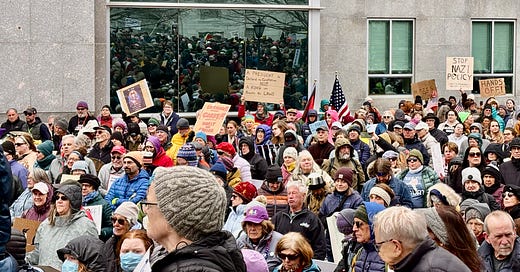





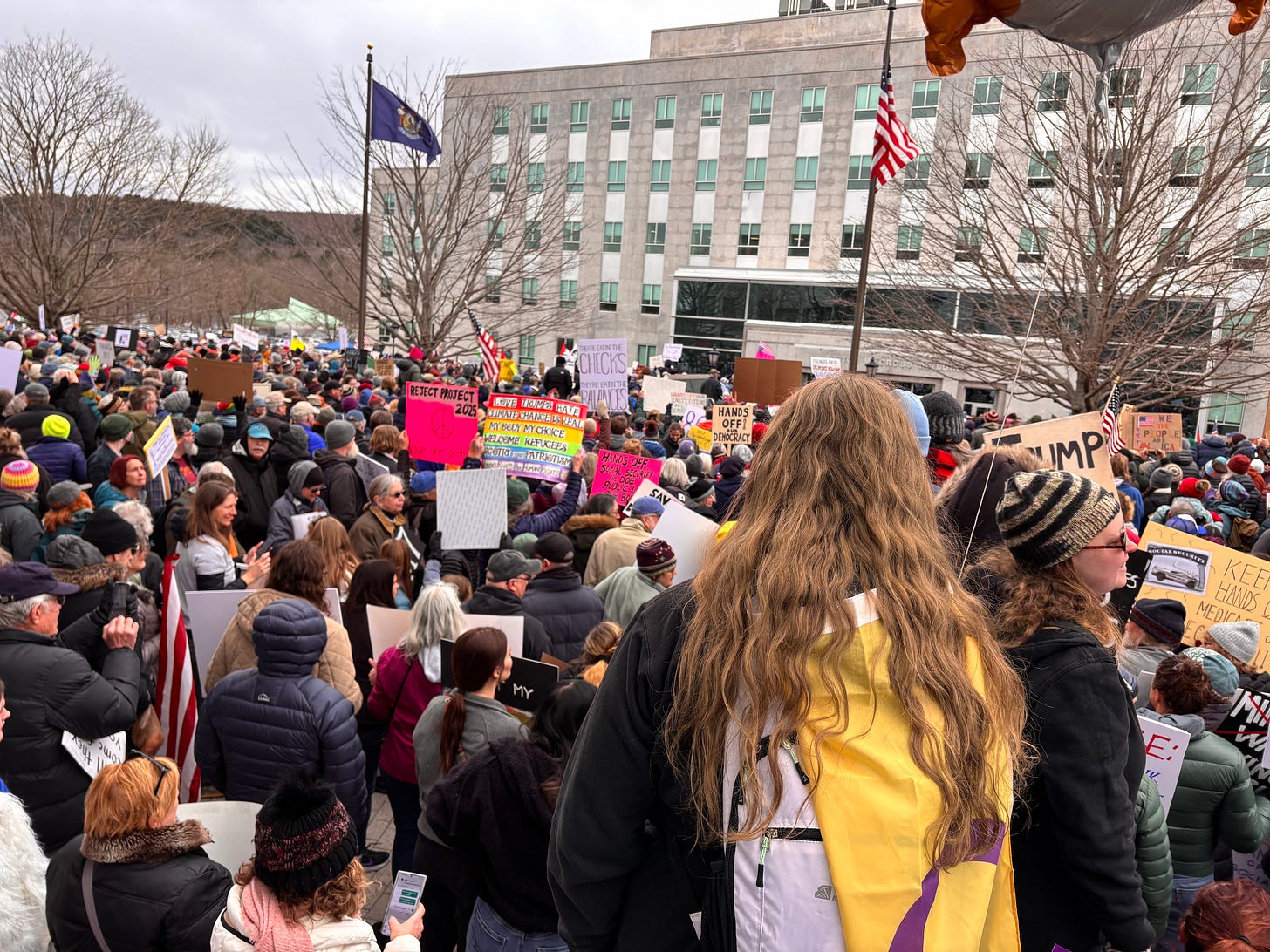
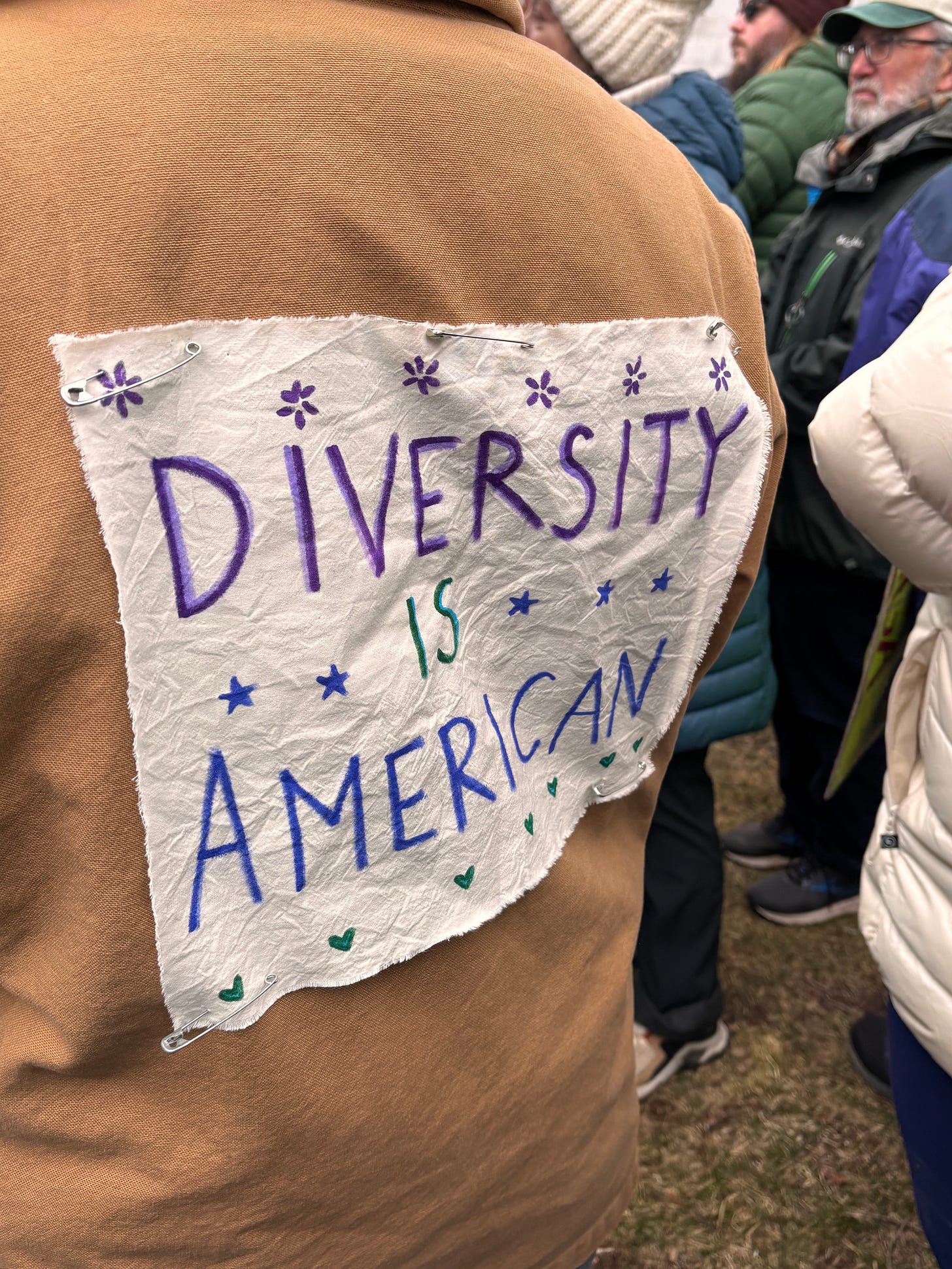

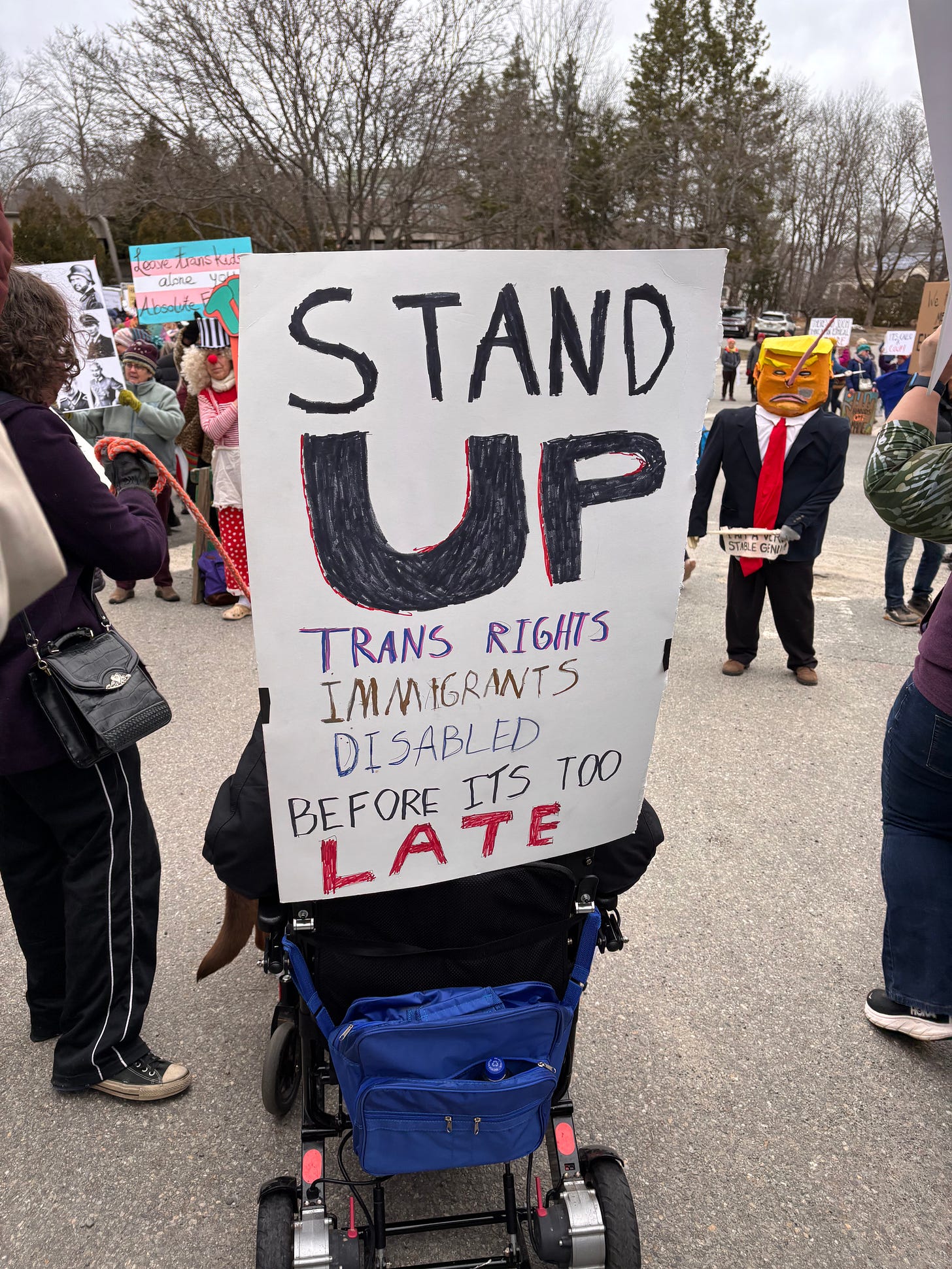
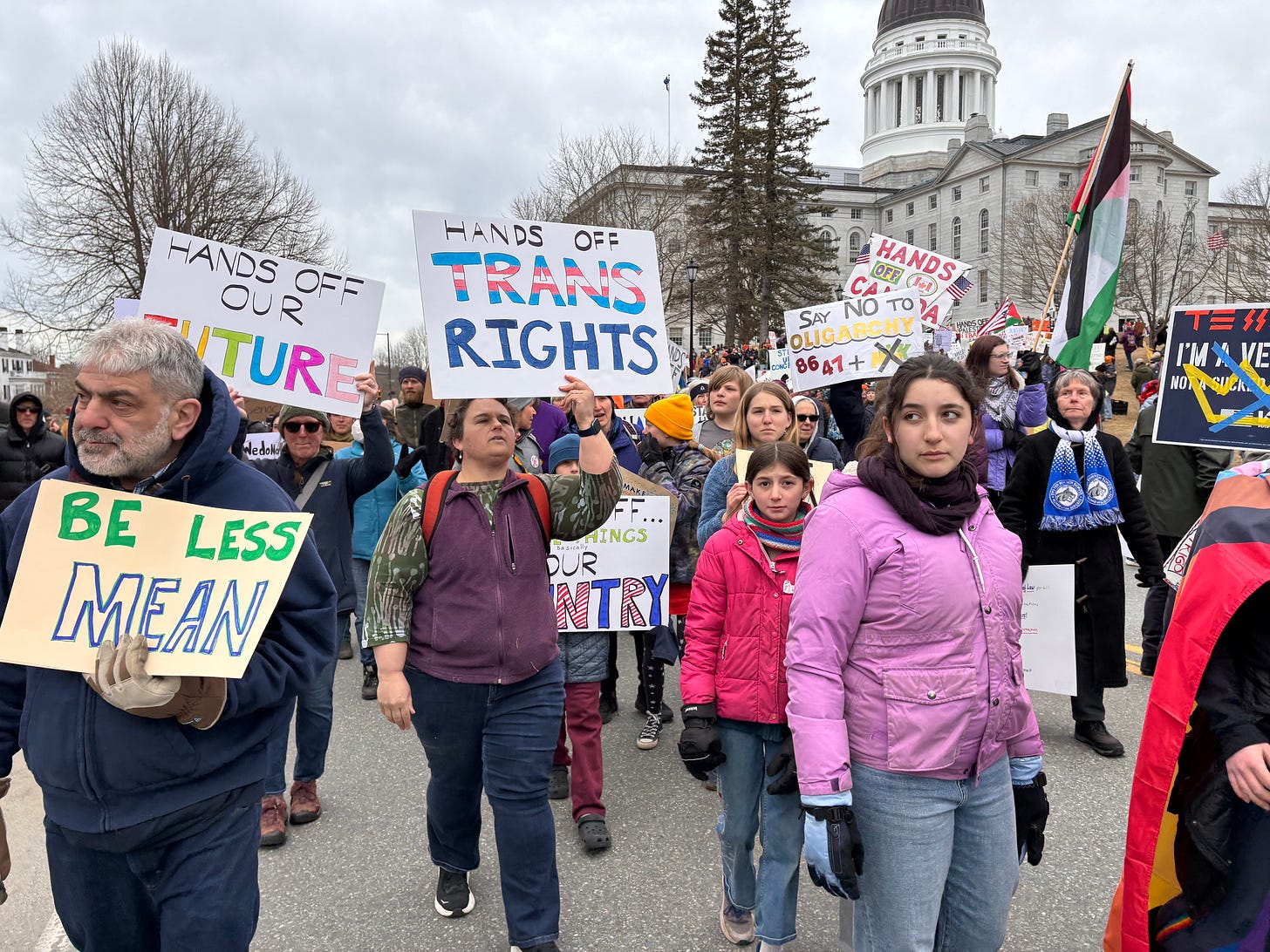

Next folks need to start piling **into** their Capitol buildings and government buildings. It is easy (yes, even with these huge marches) for elected officials to ignore citizens in spaces where they feel protected.
I used to be terrible at cooking because I rarely did it. Now that I have experience, I can give killer dinner parties without a sweat. Almost all of us are new to protests because we all assumed democracy was a given not something we had to fight for. I think our protesting skills are going to become exponentially better. I invite everyone to please proactively work to improve protests and get comfortable asking everyone you know to come out. And make it fun! Have after parties! Work on creative signs before. Don’t wait for it to get “really bad” before doing something— because it’s already really bad. And if you’re waiting for a close friend or family member to be taken away before taking action, imagine how much harder it will be.